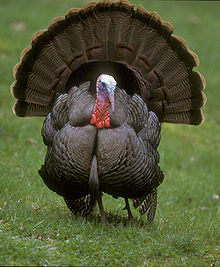To those in America, Happy Thanksgiving! To those in Canada, Happy Thanksgiving about a month ago! To those elsewhere, happy day!
Something that may have been asked before but which I didn’t address was a Dothraki word for turkey. It seems to me that there would be no turkeys in Essos, if it was modeled after Eurasia (it seems like Westeros was modeled after North America, and Essos Eurasia, or something close to that), which would mean there would be no native word for turkey. If it were to be borrowed, it’d probably be borrowed from Westeros through one of the languages of the western coast of Essos. And since the Common Tongue is spoken in Westeros, it’d probably come out as “turkey” (or something based on it).
Thanks to Abe Simpson of The Simpsons, though, we do have a handy compound for turkey we can calque: a walking bird. A Dothraki calque for that would be zir ifay. In fact, we can put that together and get zirifay. That works pretty nicely.
So, to one and all, allow me to say: Asshekhi Zirifayi Vezhvena! Stay safe, and may the Cowboys lose (after Miles Austin gets two touchdowns. I need this win in fantasy)!

So, you take the Common Tongue as being simply English, rather than a language being “played by” English (á la Tolkien’s Westernesse)? Can’t say I can contradict you, really, though there are fantasy novels that can less aptly apply the “translation” conceit.
I think it is a language being played by English, but we don’t have any examples of the “real” Common Tongue, and likely never will, so English is all we’ve got. I certainly won’t coin Common Tongue words as passed through some Western Essos language as borrowed into Dothraki!
Very good one! I remember that episode, and it’s funny you should mention it, since in the Spanish dubbing what the grandpa Simpson says is “aves gordas” or “fat birds”… so, completely different thing, hehe.
Really! That’s fascinating. I think it would be fun to see a list of how translations change from language to language. I think “walking bird” is funnier, but perhaps the Spanish translation doesn’t come across so well (aves caminandas? aves andandas?).
Well it would have been “aves caminantes” or “aves que caminan”, but yes, I see what you mean about not coming across that well. A list would certainly be hilarious!
Looks like there’s a lot of ways to do this. One *actual* non-English term for turkey that I love is the Chinese term 火鸡 (huo3ji1), which literally translates as “fire chicken”.
dammit, where is the edit button! That pinyin should read huo3ji1
I got you, brah. San athchomari.
HA! “Fire chicken.” Any idea why? And what’s the word for “phoenix”? (Because I’ve always thought of phoenixes as “fire chickens”.)
Phoenix is usually translated as 凤凰 (feng4huang2), which is a mythological bird that is not on fire nor capable of reincarnating. It’s occasionally red though — it’s associated with love, marriage, and femininity (sometimes as the female counterpart of the dragon).
“Belated” Zirifayi Vezhvena! Athchomari Vezhvena! ^^
this post inspired me to add “walking bird” as a redirect page on Wikipedia back in December (if you type “walking bird” into the search bar, it goes to the “Turkey” page). Surprisingly, no one deleted it (http://en.wikipedia.org/w/index.php?title=Walking_bird&redirect=no )